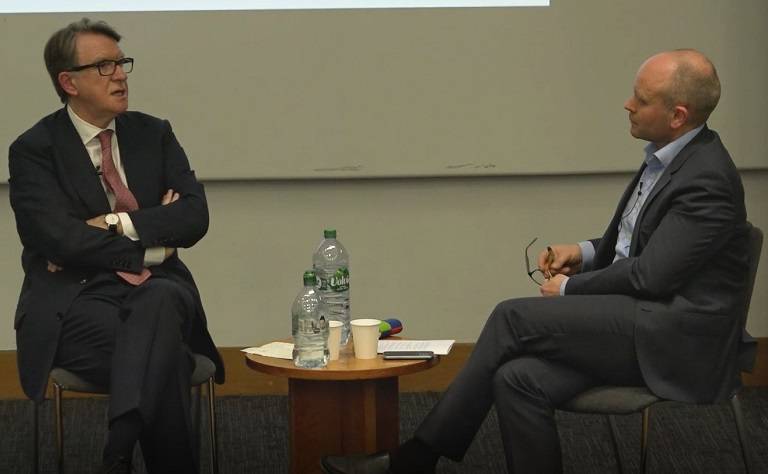New Prospects, Hard Choices: UK Trade Policy after Brexit
20 November 2017
Lily Hosking (MSc Global Governance and Ethics) on the GGI public event with Lord Peter Mandelson and Stephen Adams.

'Brexit' has been a constant source of debate and discussion for the last eighteen months, and yet the UK's future outside of the EU is looking increasingly uncertain. It was therefore a great opportunity to listen to Lord Peter Mandelson discuss the challenges of Brexit and the embarkation of the UK as an autonomous trade actor at a recent GGI public event. Prompted and questioned by Stephen Adams of the Global Counsel, Mandelson drew on his extensive experience as a UK political heavyweight and former European Trade Commissioner to weigh in on the directions the UK's post-Brexit trade policy might be heading in.
With the current stalemate in the UK-EU Brexit negotiations, Mandelson offered some insights on the challenges the UK faces in the near future. Leaving the EU will allow the UK greater flexibility in taking tactically different trade positions, and may make negotiating with counterparts easier. However, Mandelson also argued that EU membership offered the UK a far more important advantage, namely a 500 million-strong market with significant political clout. Consequently, in the past, the UK's trade counterparts may have been drawn to the opportunities offered by the EU rather than being attracted to the UK directly; the UK may have brokered trade deals effectively acting as an intermediary between external parties and the EU. The UK has therefore placed itself in a difficult trade position in exiting the EU. Its external trading partners are going to want the UK to be as aligned with the EU as possible, to allow a channel of continued access to the EU single market. However, in this lies the risk of the EU member states viewing the UK as acting as a 'Trojan Horse', allowing external parties to covertly enter the EU market.
Mandelson was clear in his opinion of the trade routes the UK should take outside of the EU's common commercial policy to protect and ensure economic prosperity. He saw three priorities for the UK's future trade policy. Of the highest priority is retaining as much continuity as possible in the UK's relations with the EU, which constitutes 50% of the UK's current export market. Second, ensuring the continuity of the agreements with the 54 countries that, together with the EU, make up 80% of the UK's export market is crucial. These two steps are of the utmost priority, as Mandelson quite rightly pointed out, because it is these agreements which UK workers' jobs and livelihoods depend on. The third priority - negotiating new agreements with new markets - should only be chased once the UK's current agreements are shored up, to preserve the UK's workforce. While a lot of emphasis has been put on pursuing new trade agreements, Mandelson argued that the anticipated gains are speculative at best and may not materialise. The UK's target states, such as China, USA, and Brazil, are increasingly big players in global trade. Comparatively, the UK is a relatively small market with little new to offer to these states other than services, so the chances of creating symmetric trade agreements are slim.
China, for example, is not overly interested in developing trade agreements with the UK, according to Mandelson. Instead, he argued, China's focus is on Asia-Pacific and US-China trade relations. The border regulations, tariffs, and other trade protection schemes that China has in place are unlikely to be overcome by the UK's attempts to initiate a binding free-trade agreement. Due to the asymmetry in market size, China will not change its regulatory approach to trade in order to accommodate the UK's wish to pursue new channels of trade.
Furthermore, the trade bodies and unions in the UK have only a fraction of the power of the states and corporations that the UK is angling to make trade deals with; the agricultural sectors in the USA and Brazil have far more power than the National Farmers' Union to influence the content of international trade deals. This, Mandelson stressed, may lead to the UK economy being 'asset-stripped' by the big players in global trade if the UK is too willing to agree to new trade relationships.
So while there is clearly still a lot left for the UK to negotiate in its departure from the EU, the quagmire of information and misinformation permeating the media makes it difficult to distil what direction the UK's trade policy is heading in. It was a privilege, therefore, to have Mandelson provide some clarity on the UK's current and future position in global trade policy.
 Close
Close


